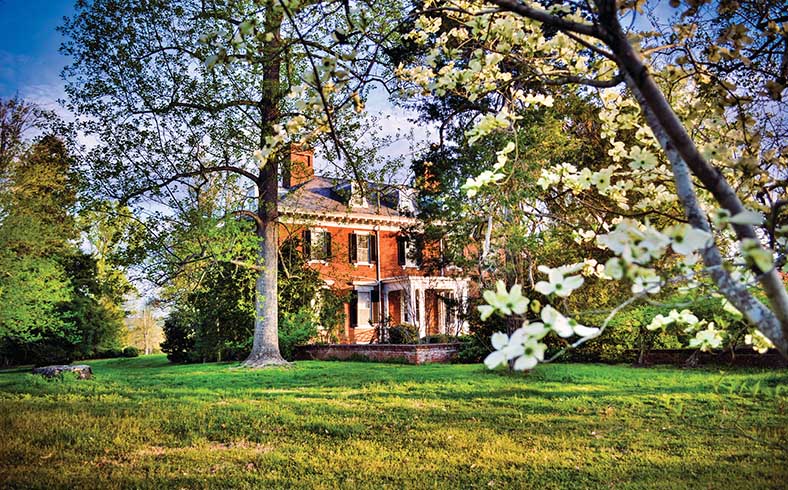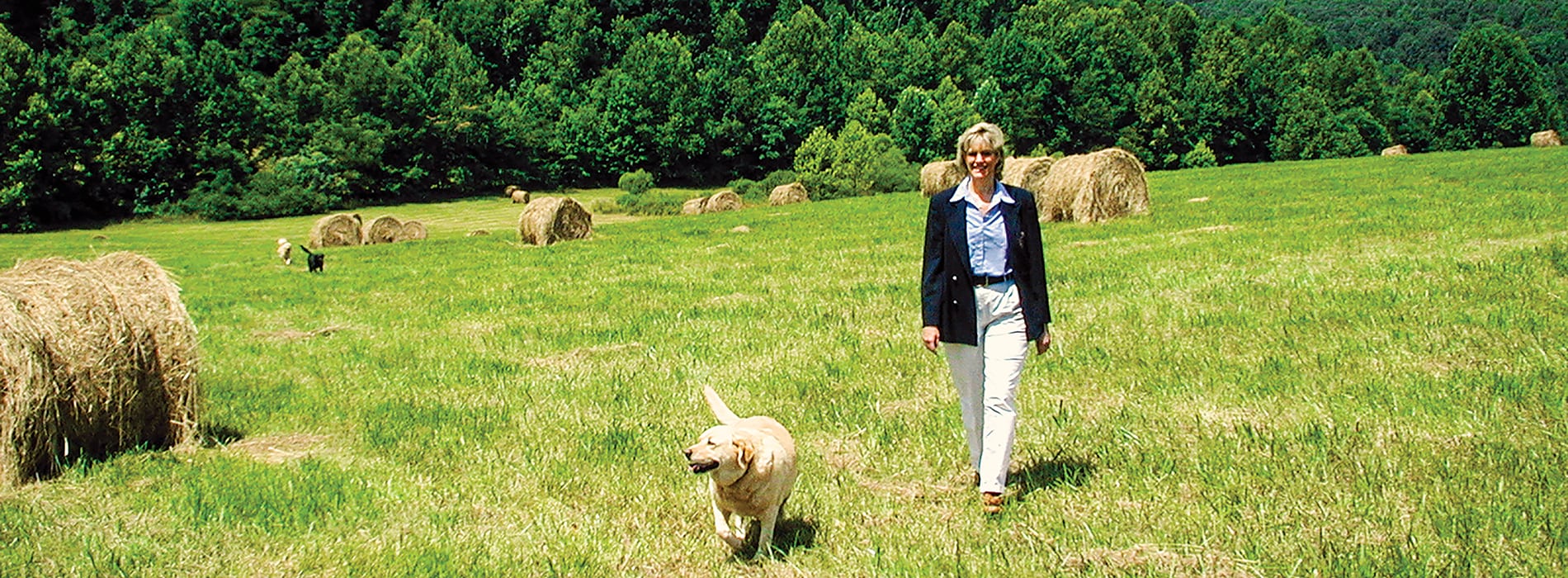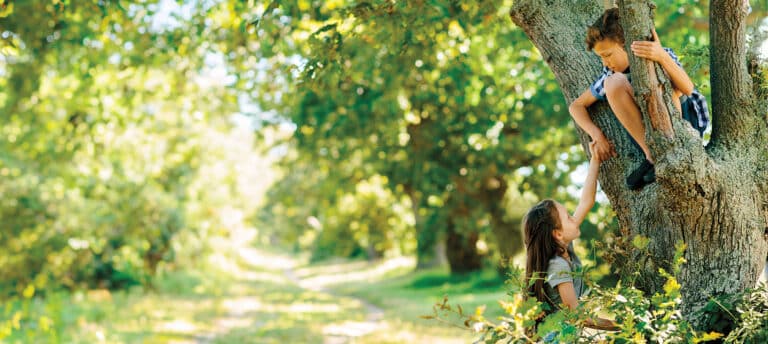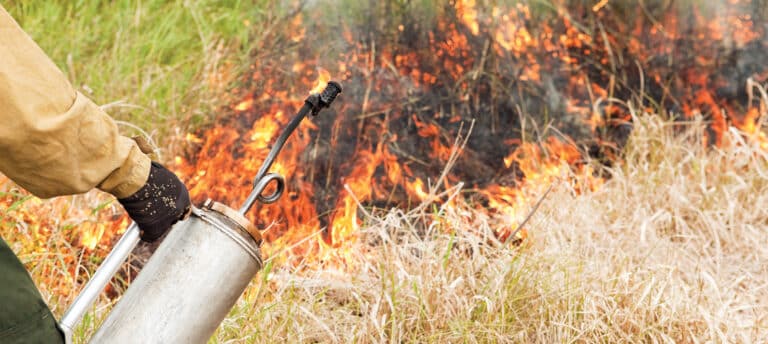In the Harvey family, the apple didn’t fall far from the tree. Gayle Harvey spent more than 20 years working alongside her father, Clyde, in the family’s central Virginia orchards and fields. The rolling hills were a classroom where life lessons of hard work, responsibility and real world economics were learned.
“I think it’s sad all children don’t have the opportunity to experience life on a farm,” Gayle, who was reared in Nelson County near Charlottesville, said. “Farm life teaches so many things like common sense, the value of hard work and a tremendous respect for nature. Life on the land shaped my core values, which are reflected in the way Gayle Harvey Real Estate Inc. evolved and the way it’s managed.”
View Gayle Harvey’s land listings on Lands of America
Land lessons
Sleeping late was rarely an option. Her dad rousted Gayle out of bed anytime one of the vehicles had a flat tire.
“After changing the twentieth tire, I assured my dad I knew how to fix a flat,” Gayle said, laughing. “He assured me practice makes perfect.”
By the time Gayle was eight years old, she was in the cattle business. Her father gave her the responsibility of raising sick or orphaned calves “on the bucket.” She substituted for their mothers, feeding them milk replacement from a bucket several times day. If, thanks to her care, the calves lived, her dad allowed her to keep them, so she could build her own herd.
“Eventually, I accumulated 80 head through my dad’s contributions and by buying bull calves from a local dairy,” she said. “Raising livestock teaches you patience and compassion.”
It also teaches basic economics.
As child and teenager, Gayle was an equestrian. She left the farm in pursuit of an economics degree at Sweet Briar College. While she was a student, her father continued to assume the expenses of her horses. Upon graduation, her dad announced she was now responsible for the cost of their care.
She replied, “But Dad, it’s difficult to make money with horses.”
He replied, “I know. That’s why it’s your responsibility now.”
When Gayle put a pencil to the cost of horse ownership, she decided to sell her horse and her tack and she invested in more cattle.
As her herd increased in size, the cattle required more grazing land. In addition to the farms owned by the family, they also leased large acreage as it became available. One day while checking on his cattle Clyde’s inspection revealed that he owned only five head out of the 85 on one of the leased farms, but he was covering 100 percent of the lease expense. He told Gayle she would be responsible for the lease payment.
She responded, “But Dad, how I am I supposed to make money in the cattle business?”
He answered, “It’s all in the game. You have to spend money to make it.”
Transitions
The family farm was started by Gayle’s grandfather with his 30-acre orchard of Albemarle Pippins that were hand packed and shipped in wooden barrels. Over time it grew into a 1,370-acre commercial apple and beef cattle operation, a large-scale enterprise for the region.
“My heart and soul belonged to the farm, so I was devastated when my parents decided to sell because of my father’s declining health and the limited labor supply,” Gayle said.
Undeterred from pursuing a career in agriculture, she moved to Michigan and spent six years as the marketing director for a large commercial apple operation. Personal computers were just beginning to make their mark on small business. Gayle was intrigued by their potential.
“Computers were equally fascinating and intimidating,” she said. “I went back to school and became hooked not only on computers, but on learning.”
The first class initiated a pattern of lifelong learning.
“The more I learn the more I want to learn,” Gayle said. “Each piece of knowledge opens a new door.” Technology is changing so rapidly that you have to be a lifelong student to keep pace, she said
Gayle has taken so many college-level and continuing education classes that it has become a running joke between her husband, Mark Leinhaas, and herself.
“These days I have to sneak around to take a class,” she said, laughing.
Home again
Although Gayle enjoyed her job in Michigan, she missed life in the South, especially the open friendliness that characterizes the people of central Virginia. When her dad was diagnosed with cancer, she returned home to be with him. After his death, she put her newfound computer knowledge to work at an IT firm.
“During that year, I discovered how much I hated being inside confined to a desk,” Gayle said.
Gayle was pursuing her MBA in e-commerce at the same time. For her thesis project, she investigated how the Charlottesville real estate community was utilizing the internet. She discovered only three agents had an internet presence and identified what would become her niche.
View Gayle Harvey’s land listings on Lands of America

Farms and estates
Initially, Gayle planned to develop an internet marketing company to support other realtors. She enrolled in Real Estate Principles class to get to know industry personnel and a light bulb went off.
“It dawned on me that maybe instead of helping real estate professionals take advantage of the internet, I should use technology as my own competitive advantage,” Gayle said.
Gayle, a self-described introvert, didn’t enter the real estate business with a pre-existing network of contacts. Initially, she searched for a mentor to help her get started in the farm and estates market believing her knowledge of the land, the people and the industry would be a benefit to any brokerage.
Many brokers downplayed the importance of her agricultural experience trying to steer her toward residential sales. In fact, one broker said, “We don’t sell farms to farmers. We sell farms to gentlemen farmers so your background isn’t necessary.”
Gayle was not deterred. Instead, she founded her own brokerage firm in 2006 staking her claim on the internet. As an early adopter of internet marketing, she reached out directly to potential farm and estate buyers. Her success at matching buyers with properties combined with her top ranking websites and internet presence quickly earned her farm and estate listings.
“Because of my internet presence, many of my clients are surprised to learn I’m not one of the larger real estate firms,” said Gayle. “I prefer being small and more personal, so I can meet the needs of both buyers and sellers.”
Over the past decade, Gayle Harvey Real Estate has grown to 10 agents. Each year has surpassed the previous one in sales, even during the recession, she said.
“One of my proudest accomplishments is building this business,” Gayle said. “People tease me about how hard I work and about being so accessible to my clients, but I love what I do and I love the people I do it for.”
The recession’s challenges increased the value of Gayle’s agricultural experience as people sought to leave the cities and find ways to become more self-sufficient. The area around Charlottesville has become a hub in the farm to table movement increasing interest in both traditional and organic farming.
“Many people come to me with a business plan and a dream of building a farming enterprise,” Gayle said. “My greatest joy comes from establishing lasting relationships with them and getting to hear their success stories.”
On Christmas morning, Gayle’s email pinged. It was a note from a high-profile female attorney in New York City, who along with her husband, recently had purchased a 500-acre Virginia farm from Gayle. The attorney had gotten nine ewes and a ram for Christmas and just wanted Gayle to know.
Gayle wrote back, “You’re probably the only woman in New York City who got sheep for Christmas. You’re definitely the only woman in New York City who is happy about it.”
She attributes her successful relationships with clients to her ability to listen, which allows her to quickly pinpoint clients’ needs.
“My clients always comment on my ability to zero-in on the type of property they want,” she said. “I find it interesting because I have a hearing impairment, but they always remark on the fact that I really listen to them.”
It also takes patience to put the right people with the right property.
“Farming taught me patience,” Gayle said. “You had to plant the trees, train them and fertilize them before you could harvest fruit. It took years. Real estate is similar. My clientele, at least the buyers, aren’t just purchasing real estate, they’re purchasing a lifestyle, so that means being patient and waiting for the right property to come along.”
When it comes to selling properties, Gayle’s competitive nature and marketing savvy trumps her patience.
“For my sellers, I’m not patient,” she said. “I understand who the target buyers are for their properties and effectively present their properties to that specific audience. We use every technological tool in our kit to get the right potential buyers on their properties as quickly as possible.”
In addition to farms and rural estates, Gayle Harvey Real Estate handles residential and historic properties.
“The area around Charlottesville is Thomas Jefferson’s country,” Gayle said. “History runs deep here.”
One of the most interesting properties she’s sold is Boswell’s Tavern, considered to be one of the most complete mid-18th Century taverns in Virginia with its oldest section dated c. 1735. In 1781, it was the Revolutionary War headquarters of the Marquis de Lafayette and a frequent meeting place of Thomas Jefferson, James Madison and Patrick Henry.
“I wonder what the walls would say if they could talk,” Gayle said. “And I’ve had the privilege of selling it twice.”
She recently sold an estate in Keswick, Cobham Park c. 1856. She matched an historic property without a conservation easement, which is rare, to buyers who were committed to conserving it without the mandate of an easement.
“Matching the right stewards with the right properties and preserving our shared history is important to me,” she said. “History is a resource that should be conserved as surely as land or water.”
Although she claims to have come to real estate through the backdoor of technology, Gayle is happy with her career path.
“I miss farming a lot, but I also enjoy technology,” Gayle said. “My job is a good balance of the two. I can help other people find and sell their farms or estates and by keeping my business on the leading edge of technology I help them more easily and quickly achieve their goals. For me personally, it’s the best of both worlds”
At an early age, Gayle learned success is not guaranteed. The lesson was delivered with the force of a hurricane—Hurricane Camille to be exact. Gayle was a third grader in 1969 when more than 30 inches of rain fell on Nelson County in less than 24 hours as Category 5 Hurricane Camille broke apart over land. More than 150 lives were lost in the county due to the flash flooding.
While the Harveys were fortunate that no one in their family was killed, the rampaging waters devastated several of the Harvey’s orchards. Gayle woke early on that August morning to see many of their trees uprooted and her father’s life work washed into a nearby river.
“I learned right then nothing is guaranteed,” she said. “You can have something today and it can all be taken away tomorrow.”
Instead of bemoaning the loss, her father got back to work reclaiming the land and replanting trees. In the 1970s, widely used commercial rootstock took five years before it would produce fruit. The family’s comeback would not be overnight. Again, Gayle learned how to be patient and take the long view.
“Chance” seedlings, trees that have not been purposely planted, spring up in orchards. Generally, these trees do not bear quality fruit. Hurricane Camille spared a few trees and one just happened to produce a viable chance seedling.
Five years after the flood, in late August, when the newly planted winesap trees were dotted with tiny green marbles, this chance seedling tree was full of plump, juicy golden-skinned fruit. Observations by horticulturists at Virginia Tech determined it was a new unique, early variety. It was a dual purpose apple, good for cooking and eating out of hand that didn’t discolor upon peeling.
The family named the apple Gingergold, after Gayle’s mom, and patented it. As the original proprietors of the variety, it fell to them to develop it and market it.
“The Gingergolds presented a wonderful opportunity and learning experience both in marketing and in life,” Gayle said. “No matter how difficult the situation, keep going, you never know what exciting opportunities might await you.”
Initially, Gayle planned to develop an internet marketing company to support other realtors. She enrolled in Real Estate Principles class to get to know industry personnel and a light bulb went off.
“It dawned on me that maybe instead of helping real estate professionals take advantage of the internet, I should use technology as my own competitive advantage,” Gayle said.
Gayle, a self-described introvert, didn’t enter the real estate business with a pre-existing network of contacts. Initially, she searched for a mentor to help her get started in the farm and estates market believing her knowledge of the land, the people and the industry would be a benefit to any brokerage.
Many brokers downplayed the importance of her agricultural experience trying to steer her toward residential sales. In fact, one broker said, “We don’t sell farms to farmers. We sell farms to gentlemen farmers so your background isn’t necessary.”
Gayle was not deterred. Instead, she founded her own brokerage firm in 2006 staking her claim on the internet. As an early adopter of internet marketing, she reached out directly to potential farm and estate buyers. Her success at matching buyers with properties combined with her top ranking websites and internet presence quickly earned her farm and estate listings.
“Because of my internet presence, many of my clients are surprised to learn I’m not one of the larger real estate firms,” said Gayle. “I prefer being small and more personal, so I can meet the needs of both buyers and sellers.”
Over the past decade, Gayle Harvey Real Estate has grown to 10 agents. Each year has surpassed the previous one in sales, even during the recession, she said.
“One of my proudest accomplishments is building this business,” Gayle said. “People tease me about how hard I work and about being so accessible to my clients, but I love what I do and I love the people I do it for.”
The recession’s challenges increased the value of Gayle’s agricultural experience as people sought to leave the cities and find ways to become more self-sufficient. The area around Charlottesville has become a hub in the farm to table movement increasing interest in both traditional and organic farming.
“Many people come to me with a business plan and a dream of building a farming enterprise,” Gayle said. “My greatest joy comes from establishing lasting relationships with them and getting to hear their success stories.”
On Christmas morning, Gayle’s email pinged. It was a note from a high-profile female attorney in New York City, who along with her husband, recently had purchased a 500-acre Virginia farm from Gayle. The attorney had gotten nine ewes and a ram for Christmas and just wanted Gayle to know.
Gayle wrote back, “You’re probably the only woman in New York City who got sheep for Christmas. You’re definitely the only woman in New York City who is happy about it.”
She attributes her successful relationships with clients to her ability to listen, which allows her to quickly pinpoint clients’ needs.
“My clients always comment on my ability to zero-in on the type of property they want,” she said. “I find it interesting because I have a hearing impairment, but they always remark on the fact that I really listen to them.”
It also takes patience to put the right people with the right property.
“Farming taught me patience,” Gayle said. “You had to plant the trees, train them and fertilize them before you could harvest fruit. It took years. Real estate is similar. My clientele, at least the buyers, aren’t just purchasing real estate, they’re purchasing a lifestyle, so that means being patient and waiting for the right property to come along.”
When it comes to selling properties, Gayle’s competitive nature and marketing savvy trumps her patience.
“For my sellers, I’m not patient,” she said. “I understand who the target buyers are for their properties and effectively present their properties to that specific audience. We use every technological tool in our kit to get the right potential buyers on their properties as quickly as possible.”
In addition to farms and rural estates, Gayle Harvey Real Estate handles residential and historic properties.
“The area around Charlottesville is Thomas Jefferson’s country,” Gayle said. “History runs deep here.”
One of the most interesting properties she’s sold is Boswell’s Tavern, considered to be one of the most complete mid-18th Century taverns in Virginia with its oldest section dated c. 1735. In 1781, it was the Revolutionary War headquarters of the Marquis de Lafayette and a frequent meeting place of Thomas Jefferson, James Madison and Patrick Henry.
“I wonder what the walls would say if they could talk,” Gayle said. “And I’ve had the privilege of selling it twice.”
She recently sold an estate in Keswick, Cobham Park c. 1856. She matched an historic property without a conservation easement, which is rare, to buyers who were committed to conserving it without the mandate of an easement.
“Matching the right stewards with the right properties and preserving our shared history is important to me,” she said. “History is a resource that should be conserved as surely as land or water.”
Although she claims to have come to real estate through the backdoor of technology, Gayle is happy with her career path.
“I miss farming a lot, but I also enjoy technology,” Gayle said. “My job is a good balance of the two. I can help other people find and sell their farms or estates and by keeping my business on the leading edge of technology I help them more easily and quickly achieve their goals. For me personally, it’s the best of both worlds”
At an early age, Gayle learned success is not guaranteed. The lesson was delivered with the force of a hurricane—Hurricane Camille to be exact. Gayle was a third grader in 1969 when more than 30 inches of rain fell on Nelson County in less than 24 hours as Category 5 Hurricane Camille broke apart over land. More than 150 lives were lost in the county due to the flash flooding.
While the Harveys were fortunate that no one in their family was killed, the rampaging waters devastated several of the Harvey’s orchards. Gayle woke early on that August morning to see many of their trees uprooted and her father’s life work washed into a nearby river.
“I learned right then nothing is guaranteed,” she said. “You can have something today and it can all be taken away tomorrow.”
Instead of bemoaning the loss, her father got back to work reclaiming the land and replanting trees. In the 1970s, widely used commercial rootstock took five years before it would produce fruit. The family’s comeback would not be overnight. Again, Gayle learned how to be patient and take the long view.
“Chance” seedlings, trees that have not been purposely planted, spring up in orchards. Generally, these trees do not bear quality fruit. Hurricane Camille spared a few trees and one just happened to produce a viable chance seedling.
Five years after the flood, in late August, when the newly planted winesap trees were dotted with tiny green marbles, this chance seedling tree was full of plump, juicy golden-skinned fruit. Observations by horticulturists at Virginia Tech determined it was a new unique, early variety. It was a dual purpose apple, good for cooking and eating out of hand that didn’t discolor upon peeling.
The family named the apple Gingergold, after Gayle’s mom, and patented it. As the original proprietors of the variety, it fell to them to develop it and market it.
“The Gingergolds presented a wonderful opportunity and learning experience both in marketing and in life,” Gayle said. “No matter how difficult the situation, keep going, you never know what exciting opportunities might await you.”



